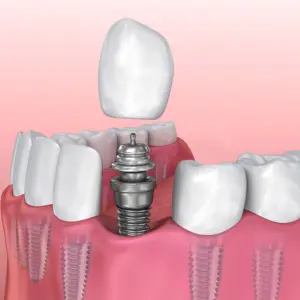
Patient Info
Dental Implants
Cosmetic Dentistry
General Dentistry
Are you wondering, "How Does Diabetes Affect Dental Implant Treatment?" For those who are managing diabetes, it is crucial to understand how the disease affects dental implant treatments. Diabetes can significantly influence the success and outcome of dental implant treatment, presenting unique challenges and considerations.
In this guide, we explore "Does diabetes affect dental implant treatment?" offering insights into the factors, risks, and strategies involved in achieving optimal treatment outcomes.
Dental implants serve as artificial tooth roots, surgically placed into the jawbone and gum tissue. Over several months, they integrate with the mouth's living tissues, mimicking natural tooth roots.
Once integrated, dental implants can support individual crowns, bridges, and partial or full dentures. Their superior strength and stability surpass traditional removable appliances and denture creams.

Diabetes often leads to uncontrolled blood sugar levels, disrupting metabolic processes and causing long-term organ damage. Fluctuating glucose levels can hinder wound healing.
Despite these challenges, diabetes shouldn't necessarily prevent dental implant placement. With stable sugar levels and proper precautions, dental implants can be successful for diabetics. In such cases, the implant loss rate is comparable to that in healthy individuals.
To ensure proper healing of the dental implant, it's crucial to reduce glucose levels and maintain long-term stability in sugar levels. Treatment includes maintaining a blood sugar diary, which tracks the patient's condition and care. During the sensitive healing phase, blood sugar levels must be closely monitored and kept stable. This demands careful attention and thorough oversight from both the patient and the practitioner.
Diabetes weakens the body's natural defense against bacterial, viral, and fungal infections due to elevated sugar levels. Inflammation and infections may spread unchecked and heal slowly. In diabetic implantation, maintaining an oral cavity free of germs and strengthening the immune system is crucial. Typically, antibiotics are prescribed before and during treatment to mitigate risks during the healing phase.
Diabetes disrupts calcium absorption and the generation of bone-forming cells. Vitamin D is necessary to transport calcium into the bloodstream, but its production is also affected by diabetes. Consequently, bone production essential for dental implant healing is hindered, increasing the risk of implant loss.
Classic restorations like bridges, crowns, or dentures offer an alternative to dental implants. However, they may not match the aesthetics or functionality of implants and can pose risks to neighboring teeth. Despite these considerations, dental implants remain a favorable option for individuals with diabetes.
After implantation, particularly with diabetes, meticulous oral hygiene is crucial to prevent inflammation. Patients must maintain regular professional cleanings and frequent check-ups to ensure the longevity of their dental implants.
Many diabetes-friendly diets emphasize foods requiring thorough chewing, like fresh fruits, vegetables, and nuts. Dentures may hinder chewing such foods, leading to the consumption of softer, processed options that can spike blood sugar levels. Dental implants restore much of the chewing function of natural teeth, facilitating a balanced diet.
Curious if dental implants suit your needs? Reach out to your implant dentist today to explore this innovative tooth replacement solution further!
Several strategies are employed to boost the success of dental implants in individuals with diabetes:
Individuals with diabetes often face a higher infection risk compared to non-diabetics due to the condition's impact on the body's infection-fighting abilities. This heightened risk extends to gum disease and potential infections following surgical procedures, including those related to dental implant placement.
Different Dental Implant Procedures for Individuals with Diabetes:
Dental implant treatment remains a viable option for individuals with well-controlled diabetes, boasting success rates comparable to those of healthy individuals. However, it's crucial for patients to maintain optimal blood sugar levels to remove the risk of implant failure. By staying vigilant about their diabetes management, patients can ensure the success and longevity of their dental implants, enabling them to enjoy restored oral health and functionality.
Are you concerned about does diabetes affect dental implant treatment? Look no further than Springhill Dental Health Center on Springhill Ave, AL, for expert guidance. Book an appointment today to discuss your options and ensure the best possible outcome. New patients can call at (251) 265-7808, while all other callers can reach us at (251) 343-1521. Your journey to a healthier smile begins here!
Despite diabetes challenges, individuals with type 1 or type 2 diabetes can typically receive dental implants if they manage their condition effectively.
The implant survival rates in diabetic patients range from 88.8% to 97.3% one year after the placement and 85.6% to 94.6% in functional terms post-prosthesis insertion.
If a dentist or dental implant specialist determines that the jaw bone lacks sufficient density or strength to support the implant securely, they may say the patient is unsuitable.
My visit was incredible. I had my “All on Four” appliances cleaned, and it was a painless and thorough experience. Dr. Scott and all his staff are very friendly. During the cleaning, Mary was gentle and let me know everything she was doing and how it would feel. She gave me tips on how to clean my implants/appliances better and gave me a small brush to do the underside more effectively. Dr. Scott and Mary suggest cleanings take place every 3 months so I will be back in December.

Dr. Byron Scott is a highly-trained and accomplished dentist. He attended The University of Alabama School of Dentistry and subsequently completed numerous Advanced Studies and Trainings. Dr. Scott is Board-Certified by The Academy of General Dentistry and has earned Mastership status (MAGD), an honor shared by only 1% of dentists. He has numerous memberships and associations, including Diplomate status with The American Board of Oral Implantology (D-ABOI) and The International Congress of Oral Implantologists (D-ICOI). Overall, Dr. Scott has dedicated his life and career to helping patients improve their oral health through expert dentistry. His goal is to help each patient keep their smile healthy, attractive, and comfortable for the duration of their lifetime.
